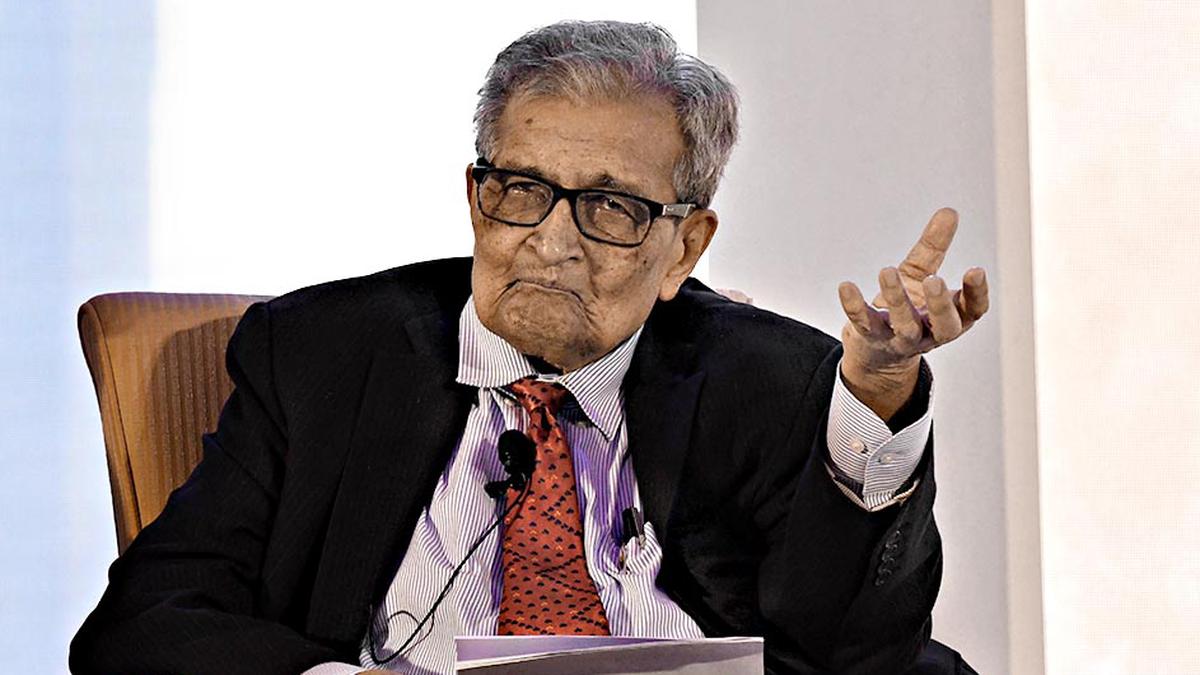
Land grab issue | Visva-Bharati asks Amartya Sen to show cause why he should not be evicted
The Hindu
The central university has claimed that Mr. Sen is in possession of 1.38 acres of land which is in excess of the entitlement of 1.25 acres. The economist has repeatedly denied the charge.
Visva-Bharati university has issued a notice to Nobel laureate Amartya Sen asking him to show cause why an eviction order will not be issued against him for not vacating a 13 decimal plot he is allegedly occupying illegally.
The noted economist was asked to reply to the notice by March 24 and appear before Ashok Mahato, the Joint Registrar and Estate Officer of the central university, personally or through a representative by March 29 along with evidence in support of Sen's assertion that he is not occupying any plot unauthorisedly.
"In case you and your authorised representative fail to appear on the said date, the case may be decided ex-parte," the notice said.
The 89-year-old Mr. Sen, who is now abroad, or his family members could not be contacted for reaction.
The university has been claiming that Mr. Sen is in possession of 1.38 acres of land on the Santiniketan campus, which is in excess of his legal entitlement of 1.25 acres.
The economist has earlier asserted that most of the land he is holding in the Santiniketan campus was purchased from the market by his father while some other plots were taken on lease.
“I hereby call upon you to show cause on or before March 24, 2023, why an order of eviction should not be made against you...,” the estate officer said in the notice dated March 17, a copy of which was made available to the media on Sunday.

“He travels fastest who travels alone”. M.V. Murthy has substantiated that thought from Rudyard Kipling. In 12 years, he has set 8,125 saplings in soil and seen them through to maturity. He has gone it alone — at multiple levels. No volunteers to work shoulder to shoulder with. No fundraising to support the purchase of native-tree saplings and tree guards. The only “volunteer” who tags along with Murthy on every tree-planting spree is his steadfastly loyal Honda Activa. The only source of funding is his wallet. At 5.30 a.m., when people are snoozing alarms, Pasumai Murthy (as he is popularly known) ranges around some Chennai neighbourhood, a plastic pot filled with water lodged in the wide floorboard of his step-through scooter After serving the saplings their “breakfast”, he gets his own, and around 9 a.m., the Activa is headed to his workplace, which lacks a fixed address. An assistant manager with Ramaniyam Builders, he is not desk-bound, his brief requiring him to visit construction sites. While strapping on the ratchet-type safety helmet, he puts on an invisible green cap. During the visits to those work sites, his mind maps spots where the Chennai sun stings the hardest, shadows being scarce. These are stark landscapes devoid of trees to offer respite from a glaring sun. In May 2013, at Vannanthurai junction, not far from his diggings in Vannanthurai in Adyar, the absence of something familiar made him acutely aware of it. A stand of trees had been removed on account of road expansion. A couple of children ran barefoot on baking tar. Elders leaned helplessly against sun-scorched compound walls. “That moment hit me,” he says. “If we can cut down trees in a day, why not grow them with equal urgency?” On August 15 that year, at Adyar Junction, he hoisted the national flag, distributed sweets, and planted 15 saplings. He was not doing anything radical, only following a rule that seldom budges from the paper it is printed on. For every tree that is felled on account of development, ten others need to be planted. People could process tree-planting exercises by groups, but not by a lone wolf. Sneers came his way; he smiled them off. He recalls being ridiculed by visitors to a Corporation gym while planting saplings at Besant Nagar beach. Now, he counts those same faces among his host of supporters, his consistent efforts to plant saplings and water them earning him their admiration. The admiration derives in part from the fact that he digs into his own pocket to keep this service going — well, growing. At a time, he buys a bundle of net-type material costing ₹1,700 out of which 25 tree guards can be made, on an average. For support to those tree guards, he buys 50 iron rods (thick and six feet long) which set him back by anywhere between ₹5000 and ₹6,000 depending on their weight. And he buys saplings from a nursery in Akkarai where he is assured of a discount by virtue of being a long-time buyer. Obviously, given the financial sacrifice all of this entails, he has got buy-in from his family to do this service. Being reasonable in the allocation of time has helped him win them over: the first half of every Sunday he reserves for tree-planting and the course of the second half is scripted by his wife Maria Priya and his daughter Meha M. He has received a doctorate degree from the The Academy of Universal Global Peace for this work.





















 Run 3 Space | Play Space Running Game
Run 3 Space | Play Space Running Game Traffic Jam 3D | Online Racing Game
Traffic Jam 3D | Online Racing Game Duck Hunt | Play Old Classic Game
Duck Hunt | Play Old Classic Game










